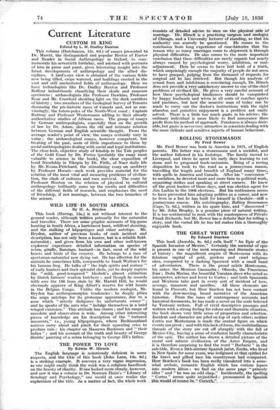CUSTOM IS KING
Current Literature
Edited by L. H. Dudley Buxton This volume (Hutchinson, 12s. 6d.) of essays presented to Dr. Marett, the distinguished and popular Rector of Exeter and Reader in Social Anthropology in Oxford, to com- memorate his seventieth birthday, and adorned with portraits of him in prose and paint, gives Interesting insight into the latest developments of anthropology and the allied dis- ciplines. A bird's-eye view is obtained of the various fields now being tilled, crops watered, and buildings erected in the vast and still unchartered fields of anthropology. Here we have technologists like Dr. Dudley Buxton and Professor Balfour industriously classifying their skulls and museum specimens ; archaeologists lilce Professor Dawkins, Professor Rose and Mr. Crawford shedding light on the dark corridors of history ; two members of the Geologies' Survey of Toronto discussing the pre-historic races of Canada and, not so con- vincingly, the totem-poles of the North-West coast ; Captain Rattray and Professor Westermann adding to their already authoritative studies of African races. The group of essays by German anthropologists, especially that on the growth of law by Dr. Adam, shows the old and intimate relation between German and English scientific thought. From the average reader's point of view, the essays certainly vary in value ; the archaeological essays, however competent, but treating of the past, seem of little importance to those by social anthropologists dealing with social and legal institutions. The close-knit, objective study of kinship in the Tale peoples of the Gold Coast by Dr. Fortes (probably the essay most valuable to science in the book), the clear exposition of bond friendship in Tikopia by Dr. Firth, of Nuer daily life by Mr. Evans-Pritchard, the stimulating essay on snobbery by Professor Hocart—such work provides material for the solution of the most vital and menacing problems of civilisa- tion, the clash of cultures and race survival. The essay by Professor Hooton on the relation of physical to cultural anthropology brilliantly sums up the merits and difficulties of the different fields of research, and emphasises the need of friendship, if not marriage, between the two branches of the science.










































 Previous page
Previous page